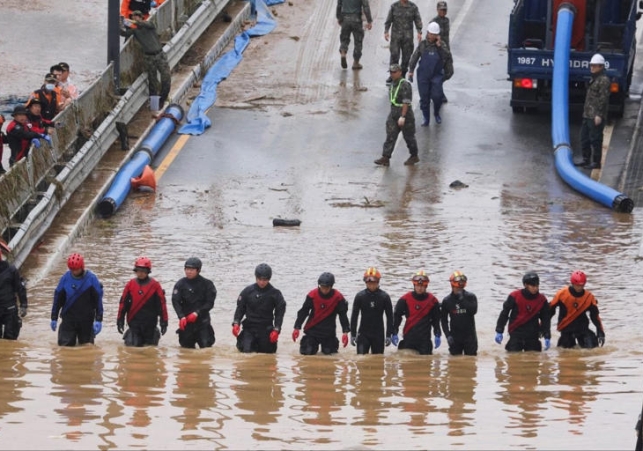
Deadly Tunnel Tragedy in South Korea Sparks Climate Change Overhaul Pledge
South Korea's Tunnel Tragedy Spurs Climate Change Overhaul Pledge
Deadly Tunnel Tragedy in South Korea Sparks Climate Change Overhaul Pledge
South Korea has been shaken by a tragic incident in which 13 people lost their lives after being trapped in their vehicles due to floodwaters. The devastating event has prompted President Yoon Suk Yeol to promise a comprehensive overhaul of South Korea's approach to combating extreme weather caused by climate change.
According to a BBC report, the full extent of the damage and the death toll remains unknown. Divers were deployed in the 685-meter-long (2,247-foot) tunnel in the city of Cheongju, where a bus and 15 vehicles became trapped after floodwater from a burst riverbank rushed in.
So far, only nine survivors have been found, leaving families of the missing individuals anxiously waiting at the local hospital, though they have come to accept the possibility of their loved ones' demise. The harrowing experience of those trapped is evident, with one woman expressing the pain of imagining her son's struggle in the cold water.
In addition to the tunnel tragedy, the mountainous North Gyeongsang region experienced landslides that claimed the lives of 19 people and caused entire houses to be swept away. The Goesan Dam in North Chungcheong overflowed, leading approximately 6,400 residents to evacuate their homes. Survivors recount their fear for their lives as rescue workers arrived in the middle of the night to save them from rising water levels.
South Korea, along with other countries such as Japan, India, China, the Philippines, and Cambodia, is facing an exceptionally intense summer monsoon season. Heavy downpours have resulted in floods, landslides, and power outages across the nation.
President Yoon Suk Yeol acknowledged the increasing frequency of such extreme weather events and emphasized the urgent need to address climate change. The country is expecting more rainfall in the coming week, with showers forecasted until Wednesday. The government has designated the heavily affected areas as "special disaster zones," making them eligible for state support. Climate change, characterized by a warming atmosphere capable of holding more moisture, is believed to be responsible for the unprecedented rainfall experienced in South Korea and similar regions.





